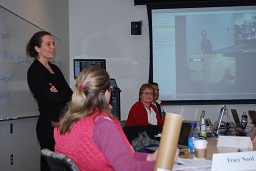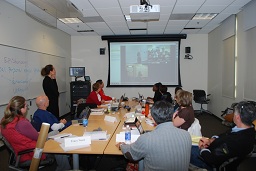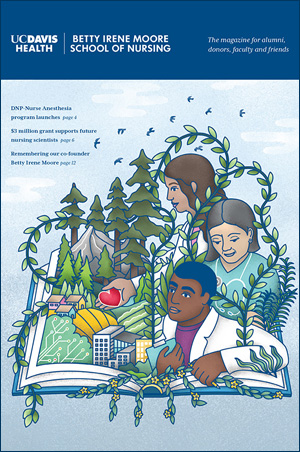Course distinctions: Methods for Teaching Nursing and Health Sciences
Betty Irene Moore School of Nursing offers first cross-campus nursing course in the UC system

Instructor Piri Ackerman-Barger facilitates one of the course's three live class sessions.
For the first time, graduate students in nursing programs across the University of California system learned together as part of a hybrid—online and in-person—course led by the Betty Irene Moore School of Nursing at UC Davis.
Graduate nursing students from UC Davis, UC Irvine and UC San Francisco participated in the course, Methods for Teaching Nursing and Health Sciences: Assessment/Evaluation of Learning, during the 2013 winter quarter. The students and instructor interacted primarily online, through discussion boards, peer- review assignments and other Web-based features. In addition, all students and the instructor took part in three live class sessions, using Web-based video conferencing technology to connect the three participating campuses. The course is considered a hybrid, as it combines elements of online and in-person education.
“This course speaks to the leadership and innovation of the Betty Irene Moore School of Nursing,” said Piri Ackerman-Barger, the nurse scientist and consultant who teaches the class. “This class is breaking new ground for UC nursing education and there is a definite need for it.”
The collaboration grew out of the UC Nursing Cross-Campus Task Force, convened by the UC Office of the President and designed to cultivate ideas for collaboration across UC campuses. Together, the nursing programs decided to pilot a collaborative elective course.
This course is also part of a larger movement to expand online education across the University of California system. In January 2013, the UC Board of Regents pledged in the coming years to expand the number of online courses UC offers, as a way to leverage existing resources to enroll more students in the courses they need.
A January 2013 UC Office of the President report to the UC Board of Regents states that the potential for cross-campus enrollment is a major benefit of online education.
“Students are able to take advantage of academic expertise or unique course offerings from across the system, greatly increasing the richness of their UC education,” the report states. “For some niche courses, local student enrollment alone may not support the course, but combined online enrollments across UC would enable the offering.”

Students from UC Davis, UC Irvine and UC San Francisco interact via video conferencing technology.
This course’s delivery model offered multiple benefits for students, according to faculty and staff at the UC Davis School of Nursing. The flexible schedule of the course—students complete most of the work on their own time, in keeping with the schedule set forth in the course syllabus—allows students to pace their own learning and also enables those who are also working professionals to better juggle their schedules. Offering cross-campus courses also improves educational accessibility for students, increasing the chances that students will be able to enroll in the classes they are most interested in, according to Ackerman-Barger.
The students who took part in the course agree.
Alexa Merchant, a student in the Adult Gerontological Nurse Practitioner master’s-degree program at UC Irvine, was keen to learn about the evaluation strategies covered in the course. But she also wanted a class that could fit into her schedule, which includes full-time studies and also working part-time as a registered nurse.
“This class enabled me to learn about something I'm really interested in, and continue to interact with fellow students by attending set class periods three times during the quarter, while participating in the virtual classroom at my convenience,” Merchant said.
The course is designed to enhance the teaching skills of nurses who may serve as instructors in formal roles at colleges and universities, or informal roles, as health-care administrators, leaders or clinicians who conduct patient education.
The fundamental question of the class is: “How do you know you’re teaching what you think you’re teaching?” Ackerman-Barger said.
All students complete an applied project in which they teach content to a group of learners and then evaluate the effectiveness of their teaching. The projects involve learners in a range of settings: new nursing students learning about bedside care; nurses teaching other nurses in hospitals regarding emergency situations; and professional development for frontline nurses related to the proper documentation of care plans in electronic health records.
Rayne Soriano, a doctoral student at the Betty Irene Moore School of Nursing, enrolled in the class because he plans to pursue a nursing instructor position in the future. He is currently the manager of the Nursing Informatics and Clinical Transformation Program at Kaiser Permanente.
In addition to the content knowledge Soriano gleaned about teaching through the class, the course gave him a window into the many skills that aspiring educators like him will need to effectively teach future generations.
“The instructors of the future need to have new classroom competencies, including how to manage digital and technical tools,” Soriano said.
The task force of UC nursing schools plans to roll out additional cross-campus courses for the 2013-2014 academic year.





